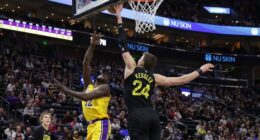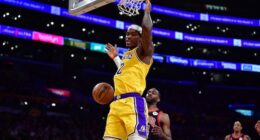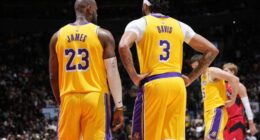Earvin “Magic” Johnson Jr. was born on August 14, 1959 in Lansing, Michigan. Johnson became a basketball fan at a young age, idolizing the likes of Bill Russell and Earl Monroe. Johnson would attend Everett High School in Lansing which is where he got the nickname “Magic” as a sophomore.
Magic would have an excellent high school career. As a senior he averaged 28.8 points and 16.8 rebounds while leding Everett to a 27-1 record and a state championship. At the time he was considered the best high school player to ever come out of the state of Michigan, being named to the All-State team twice as well as a McDonald’s All-American in his senior year.
COLLEGE CAREER
Wanting to remain close to home, Johnson decided to attend Michigan State University in Lansing and though he only stayed for two years, he had an immediate and massive impact.
As a freshman he averaged 17.0 points, 7.9 rebounds, and 7.4 assists and was named to the All-American Second Team. Magic led the Spartans to a 25-5 record, the Big Ten Championship, and a berth in the Elite Eight where they were defeated by Kentucky.
Johnson had another stellar year in his second season, averaging 17.1 points, 7.3 rebounds, and 8.4 assists. He was a consensus First Team All-American and led the Spartans to the national championship game against his eventual NBA rival Larry Bird and the Indiana State Sycamores. In what was the most watched college basketball game of all-time, Johnson would lead Michigan State to the National Championship with a 75-64 win and was named Final Four Most Outstanding Player.
LAKERS CAREER
The Los Angeles Lakers acquired the New Orleans Jazz first round pick as a compensatory selection for Gail Goodrich signing in New Orleans in the summer of 1977. The Jazz finished with the worst record in the NBA, giving the Lakers the top overall pick when they won a coin flip, which they used to take Magic Johnson first overall, pairing him with legendary center Kareem Abdul-Jabbar who was considered by most to be the best player in the NBA.
Johnson’s rookie season was legendary as he immediately stepped in as the starting point guard, giving the Lakers a new dimension. Though he lost out on Rookie of the Year to Larry Bird, Magic still averaged 18.0 points, 7.7 rebounds, 7.3 assists, and 2.4 steals. He was named an All-Star starter and made the All-Rookie Team.
He got even better in the playoffs, putting up 18.3 points, 10.5 rebounds, 9.4 assists, and 3.1 steals. The Lakers would advance to the NBA Finals and thanks to Kareem’s gutsy performance in Game 5, the Lakers would go up 3-2 in the series, but Abdul-Jabbar had to sit out Game 6.
In what will forever be one of the greatest performances in NBA Finals history, Johnson would jump center and play all positions on his way to a 42 point, 15 rebound, 7 assist performance as the Lakers would defeat the Sixers to win the NBA Championship. Magic would be named NBA Finals MVP after his legendary night.
Johnson’s second season was a rough one as he missed 45 games due to torn cartilage in his knee. He would still average 21.6 points, 8.6 rebounds, 8.6 assists, and a league-leading 3.4 steals and return before the playoffs, but the Lakers were upset by the Houston Rockets in the first round of the playoffs. Following the season the Lakers would sign Magic to a 25-year, $25 million contract, the largest in NBA history at the time.
Things went back to form in 1982 as Magic had his best season yet, nearly averaging a triple-double with 18.6 points, 9.6 rebounds, and 9.5 assists. He also led the league in steals for the second straight year and made his first All-NBA team, a second-team selection. Johnson became just the third player in NBA history with 700 points, rebounds, and assists in one season joining Wilt Chamberlain and Oscar Robertson.
It was also early in this season in which Johnson got into a dispute with head coach Paul Westhead. Magic would demand to be traded, but owner Jerry Buss would fire Westhead and replace him with Pat Riley. Magic was blamed for Westhead’s firing and was booed across the league, even though Buss has said he had planned to make the move before Magic’s demand.
Despite all of the drama the Lakers would return to the NBA Finals, again facing the Philadelphia 76ers and again Magic put forth an outstanding performance. Johnson would win his second NBA Finals MVP, averaging 16.2 points, 10.8 rebounds, and 8.0 assists as the Lakers defeated the Sixers in 6 games. Despite taking just 3 shots in the final game, Magic dominated, dropping a triple-double with 13 points, 13 rebounds, and 13 assists while also tallying 4 steals and 2 blocks.
In 1983 Magic Johnson would be named to his first All-NBA First Team, averaging 16.8 points, 8.6 rebounds, and a league-leading 10.5 assists. The Lakers would win 58 games and return to the NBA Finals for the third time in four years for a meeting with the Sixers, but with any players hobbled, L.A. was swept in four games.
After trading Norm Nixon in the offseason, Johnson took a huge step forward in 1984 no longer having to share playmaking duties. Magic averaged a career-high 13.1 assists, to go along with 17.6 points and 7.3 rebounds. He was again named an All-Star and All-NBA First Team selection while the Lakers returned to their third straight NBA Finals.
This time facing Larry Bird and the Boston Celtics, the Lakers would fall in seven games. Magic caught a lot of criticism following the series after shooting just 5-14 in Game 7 while also committing seven turnovers including a crucial one in the final minute that effectively ended the series.
By 1985 head coach Pat Riley had really turned things over to Magic, truly embracing the fast-paced style that would define this era of Lakers basketball known as ‘Showtime.’ Johnson averaged 18.6 points, and 12.6 assists while being named to his third straight All-NBA First Team and All-Star Game.
The Lakers were on a mission in this season, winning 62 games and making their fourth straight NBA Finals appearance for a rematch with the Celtics. The Lakers were blown out in Game 1, a contest known as the Memorial Day Massacre, but the Lakers would recover thanks to Magic and Kareem.
Johnson had a special performance in Game 5 with 26 points and 17 assists while notching another triple-double with 14 points, 14 assists, and 10 rebounds in Game 6 as the Lakers finally beat the Celtics in an NBA Finals for the first time in franchise history. Though Kareem’s age-defying performance would land him NBA Finals MVP, Magic averaged 18.3 points and 14.0 assists in winning his third NBA Championship.
Magic continued his high level of play in 1986, leading the NBA in assists for the third time and landing another All-Star and All-NBA First Team selection. Johnson averaged 18.8 points and 12.6 assists and the Lakers won 62 games again. In the playoffs however, things became unraveled as L.A. was upset by the Rockets in the Western Conference Finals, despite Magic averaging 21.6 points and 15.1 assists in the postseason.
The 1987 season may have been Magic’s best from an individual standpoint. He averaged a career-high 23.9 points to go along with 12.2 assists on the way to winning his first Regular Season MVP award. Magic would again be named to the All-NBA First Team and All-Star team as the Lakers won 65 games and lost just one game in their playoff march towards a rubber match with Larry Bird and the Celtics.
Magic would leave no doubt as to who was the NBA’s best player in this series as the Lakers would vanquish the Celtics for the second time in six games. Game 4 would bring arguably the most memorable moment in Magic’s career as he would hit his own sky hook shot in Boston to silence the crowd and give the Lakers the win and a 3-1 series lead. Johnson averaged 26.2 points, 13.0 assists, 8.0 rebounds, and 2.3 steals, capturing his third NBA Finals MVP and fourth NBA Championship.
After Pat Riley guaranteed a Lakers repeat at the championship parade, something that hadn’t been done since the 1960s, the pressure on the Lakers was immense in the 1988 season. Though Magic missed 10 games with a groin injury he still put forth averages of 19.6 points and 11.9 assists while continuing his streak of All-Star and All-NBA First Team selections.
The Lakers would return to the NBA Finals, surviving two seven game series on the way, but this time would face Isiah Thomas and the Detroit Pistons. With the Lakers down 3-2, Magic would help L.A. survive an amazing 43 point performance from Thomas as he finished with 22 points and 19 assists to force a Game 7.
In that deciding game, James Worthy would have his greatest career performance with a triple-double, but Magic would also add 19 points and 14 assists as the Lakers defeated the Pistons 108-105 for Johnson’s fifth and final NBA Championship.
1989 would be another banner year for Johnson statistically as he won his second Regular Season MVP award, averaging 22.5 points, 12.8 assists, and 7.9 rebounds. The Lakers won 57 games and swept through the Western Conference on the way to their third straight NBA Finals where they faced the Pistons in a rematch from the previous season.
But Magic would go down with a hamstring injury in Game 2, and the Lakers would be swept by Detroit.
With Kareem retiring following the 1989 season Magic would step up to the plate once again, winning his second consecutive and third career Regular Season MVP award after averaging 22.3 points and 11.5 assists. The Lakers won 63 games and seemed to be poised for another NBA Finals trip, but were upset by the Phoenix Suns in the second round.
By 1991, Magic had lost much of his quickness, but compensated by getting stronger. He averaged 19.4 points and 12.5 assists as the Lakers remained amongst the NBA’s elite. Magic was named to his 11th All-Star team as well as his 9th and Final All-NBA First Team and the Lakers would return to the Finals to face Michael Jordan’s Chicago Bulls.
Magic would give a throwback performance with 19 points, 10 rebounds, and 11 assists as the Lakers stole Game 1 on the road, but things went downhill from there. The Bulls would sweep the next four games, winning their first NBA Championship.
Ahead of the 1991-92 season Magic would announce that he had contracted the HIV virus and retired from the NBA immediately. The news came as a shock to the entire world, stretching far beyond basketball.
Despite retiring before the season, Magic was voted as a starter in the NBA All-Star Game. Though there were some reservations at the time at playing with someone with the HIV virus, Johnson would play in the game, finishing with 25 points and 9 assists to win his second All-Star Game MVP.
At the end of the 1994 season, Johnson took over as head coach of the Lakers replacing the fired Randy Pfund and interim coach Bill Bertka. The stint didn’t go too well as the Lakers finished just 5-11 under Magic and he chose not to return after the season.
On January 26, 1996 Magic Johnson officially returned to the Lakers as a player. At 36 years old, Magic would play power forward and immediately had an impact with 19 points, 8 rebounds, and 10 assists off the bench in his first game back. He would play 32 games, averaging 14.6 points, 5.7 rebounds, and 6.9 assists. The Lakers would win 53 games and make the playoffs, but lose to the Houston Rockets in four games.
RETIREMENT
Though Magic considered returning for another season, he decided to retire permanently after the season.
In February of 2017 Magic returned to the Lakers in an executive role, replacing Jim Buss as President of Basketball Operations. The Lakers would sign LeBron James with Magic reportedly meeting James at his home at the start of free agency. Johnson’s tenure was short-lived however as he abruptly resigned ahead of the Lakers’ final game of the 2019 season.
LEGACY
To this day Johnson considered by most to be the greatest point guard in the history of the NBA. His 10,141 assists were an NBA record at the time and he still sits 5th on the All-Time list, while also holding the record for career assist average at 11.2. Magic also holds the record for assists in a playoff game (24), a Finals game (22), and career playoff assists (2,346) while ranking second all-time with 138 career triple-doubles.
Many consider Magic Johnson as not only the greatest Los Angeles Lakers player ever, but arguably the greatest NBA player ever.
The Lakers honored Magic by raising his number 32 jersey in the rafter on February 16, 1992. He was also honored with a bronze statue outside of Staples Center on February 11, 2004.



